Growing healthy, robust onions requires more than just good soil and plenty of sunshine; it also involves providing them with the right nutrients. Organic fertilizers play a crucial role in ensuring the optimum growth of onions, offering a sustainable and eco-friendly alternative to synthetic options. In this blog, we will explore the best organic fertilizers for onions, discussing their benefits, application methods, and how they contribute to a thriving garden. Whether you are a seasoned gardener or just starting out, this guide will help you understand the importance of organic fertilization and how to implement it effectively for a bountiful onion harvest.
What is the Best Organic Fertilizer for Onions?
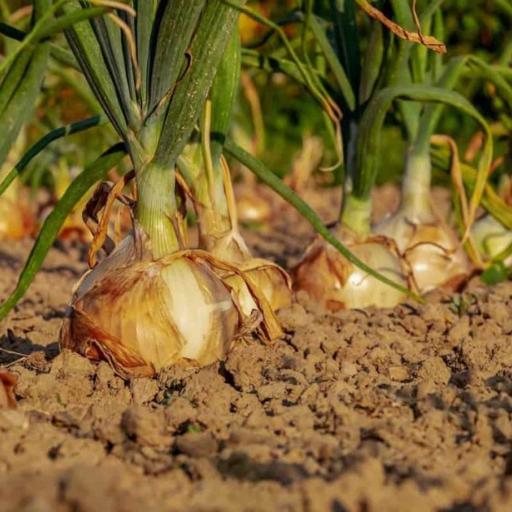
Understanding Various Kinds of Organic Fertilizers
When it comes to organic fertilizers for onions, there are a number to choose from and they all have their own special advantages catering for different gardening needs. Compost is an excellent all-rounder, feeding the soil with essential elements and improving its texture. Manure, especially cow or chicken, presents itself as another valuable alternative because this provides useful nitrogen, phosphorus and potassium in slowly released forms that boost onion growth. With its high phosphorus content bone meal promotes good root development and bulb formation. Seaweed extract is rich in trace minerals as well as plant growth hormones which foster overall plant health and resistance. Fish emulsion on the other hand has a balanced nutrient profile but is somewhat pungent.
By integrating these organic fertilizers into your gardening routine you can ensure that your onions receive the nourishment they need for a successful and abundant harvest.
Benefits Associated with Using Compost on Onions
Compost is a priceless asset when it comes to growing strong onions since it renders many gains that make plants healthier leading to better yields at harvest time. Firstly, compost gives the soil essential nutrients like nitrogen, phosphorus and potassium necessary for onion growth. Secondly it improves soil structure resulting in more air spaces which enable bulbs development. It also supports beneficial microbial activity needed to sustain a vigorous soil ecosystem responsible for increased nutrient uptake by plants hence disease resistance. Furthermore, composting obviates chemical fertilization making it an eco-friendly alternative supporting sustainable horticultural practices towards improved crop production system. When compost is incorporated in onion farming systems not only does it promote crop health but also sustains sustainable agriculture.
Usage of Blood Meal in Your Onion Garden
To begin with blood meal is an organic fertilizer containing high levels of nitrogen which can greatly enhance your onion farm yields if used properly. For effective use of blood meal in your onion garden incorporate it into the soil before planting.
For every 100 square feet of garden area, spread about 1 to 2 pounds of blood meal into the top six inches of soil. This results in a slow release source of nitrogen that encourages robust foliage growth and overall plant health.
Lightly mix a handful of blood meal into the soil around the base of each plant, about three inches away from the stems. Do this once every three to four weeks especially in early growth stages. Ensure that you don’t overdo it though as too much nitrogen might inhibit bulb formation at the expense of abundant foliar growth instead.
After applying blood meal always water garden thoroughly so as to facilitate nutrient uptake. Correctly using blood meal makes certain that your onion plants receive enough supply with nitrogen i.e., lush vigorous growth without compromising bulb formation.
How Do You Fertilize and Grow Onions Effectively?
Preparing the Soil with balanced Fertilizer
To properly feed and cultivate onions, start by preparing the soil with a balanced fertilizer. First, select a proper drainage site that gets full sun. Before planting anything, mix in a balanced fertilizer into your soil like 10-10-10 blend. The rate of application depends on what is written on the package, which is normally about 2 to 3 pounds per 100 square feet as well as mixing it well to incorporate it in the soil’s top six to eight inches. This ensures availability of nitrogen for green growth, phosphorus for root development and potassium for overall plant health. Onions thrive when they grow in soils having an optimal pH range between 6.0 and 7.0.
Application Techniques for Granular Fertilizer and Liquid Fertilizer
Granular Fertilizer
Granular fertilizers are simple to use and best suitable for pre-planting soil preparation. They should be broadcasted over the surface of the ground being careful to cover all areas uniformly either manually or using a spreader. After applying granular fertilizers one has to work them into their soils but this should be done within the first four or six inches so that plants can easily access nutrients provided by these fertilizers at any time they want them applied in small quantities at regular intervals during growing period… All of this will enable good dissolution of granules when watering takes place after granular fertilizers have been put in place thereby making nutrient absorption possible with ease given that slow release properties are characteristic of such manure.
Liquid Fertilizer
In contrast to solid forms, liquid ones provide nutrients faster hence they may be applied directly onto the soil or sprayed as foliar applications. When applying on land follow instructions given on packaging such as mixing liquid content with water because most likely you will find that diluting it is required,. Apply evenly around & beyond base of plant(s). The ideal way to go about this is by using a spray bottle, mist the fertilizer on leaves so that quick absorption of nutrients through the leaf will occur. It is most suitable for plants that are in dire need of quick food boost considering that it has the ability to supply readily available nutrients at any particular growth stage or appearance of symptoms associated with nutrient deficiency. There should be slight watering after that to enable penetration of fertilizers and reaching the root zone.
Step-by-Step Guide to Fertilizing Onion Sets
Prepare the Soil: Start by making sure soil is loose and well drained. Onions grow best in soil having pH range between 6.0 and 7.0. In case there is a need, lime or sulfur should be used for pH adjustment.
- Choose the Right Fertilizer: Use balanced fertilizer like 10-10-10 or 12-12-12 formulation. Alternatively, use high-phosphorus manure can be used as it encourages strong root system development.
- Initial Application: Before planting, apply granular fertilizer to your soil at an amount of about two (2) – three (3) pounds per one hundred square feet top four (4) – six (6) inches.
- Plant the Onion Sets: Plant onion sets about 1 inch deep and 4 inches apart in rows at least 12 inches apart.
- Side-Dressing: Side-dress onions with additional fertilizer around three weeks after planting them. Spread out the manure while maintaining a distance of not less than three inches from plant base in order to prevent roots from scorching under direct contact with chemicals present in fertilizers especially when they come into contact with their roots.
- Regular Feeding: Liquid fertilizers are excellent sources of steady nutrients during growing season because they can be applied every fortnight throughout this period; mix liquid feed following instructions given on package then pour it at bases of plants similar to earlier described practice, which is why liquid fertilizers are best option for quick nutrient boost especially during critical growth stages or when there is suspected nutrient deficiency in plants. Lightly water the garden afterwards to allow the fertilizer to seep into the soil and penetrate the root zone.
- Watering: For the onions, you should maintain a regular watering schedule. To allow fertilizers to be absorbed and facilitate proper development of the onions, such are to be soaked deeply once in seven days or more often if there is a hot spell.
- Monitor and Adjust: You should watch for signs of nutrient deficiency in the onion plants like yellow leaves during their growth period. Adapt your fertilizer program as needed to ensure that your plants grow well.
Adhering to these steps will help guarantee healthy robust onion sets that produce high yields.
Why is Nitrogen Important for Onion Growth?
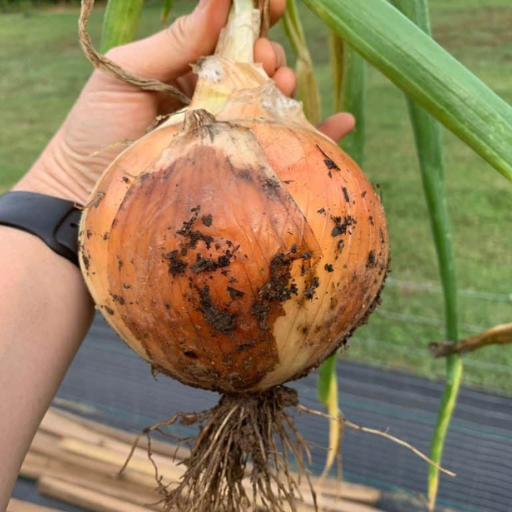
How Nitrogen Impacts the Health of Onions
Nitrogen is a vital element that plays numerous roles in the life of onions. The first role that nitrogen plays is to form Chlorophyll; therefore, it is fundamental on photosynthesis. Sufficient nitrogen will enable the conversion of light from the sun into energy needed for growth by onions. Secondly, nitrogen is required by plants during synthesis of amino acids because they are building blocks for proteins, which are important in cell development and repair tissue. This helps in having well developed onion foliage that supports growing larger bulbs with higher yield as a result of photosynthetic material . Nonetheless, nitrogen levels must be balanced since excessive leads to disease susceptibility and too much leaf formation, and this affects bulb size negatively. To maintain optimum nitrogen levels and have a successful onion crop, regular soil testing and fertilization need to be done.
Types Of Nitrogen Fertilizer And How To Use Them
There are several types of fertilizers containing nitrogen for onions with different features and application methods available to support their growth. Below are some most commonly used ones:
Ammonium Nitrate (34-0-0):
- Composition: 34% nitrogen.
- Application: Normally directly applied on soil as top-dressing. Due to its high solubility this fertilizer gives rapid response to plants through immediate availability of N-nitrogen.
- Considerations: Be careful as time goes on it can cause soil acidification hence adviseable to do regular soil test so as to keep pH balance.
Urea (46-0-0):
- Composition: 46% nitrogen.
- Application: As solid granules or dissolved in water; urea can be applied either way. For instance, when growing this crop it’s frequently used as top dressing or incorporated into planting beds prior sowing seeds aiming at even distribution throughout the bed.
- Considerations: Can easily volatilize hence after use; needs watering with clean water to prevent nitrogen loss through volatilization. It is suited for soils with pH slightly acidic to neutral.
Calcium Nitrate (15.5-0-0 + 19% Ca):
- Composition: 15.5% nitrogen, 19% calcium.
- Application: Normally via fertigation systems or as a foliar spray. It is good in providing immediate nitrogen boost and also important in supplying vital calcium that guards against disorders like tip burn.
- Considerations: Ideal for sandy soils or areas with low calcium levels.
Blood Meal (12-0-0):
- Composition: 12% nitrogen.
- Application: The best way to use this organic fertilizer is by incorporating it into the soil before planting or applying it at one side of the crop row. Blood meal releases nitrogen slowly hence can provide continuous supply of nutrient throughout the cropping period.
- Considerations: Recommended for organic farming and helps improve soil structure too.
Fish Emulsion (5-1-1):
- Composition: 5% nitrogen, 1% phosphorus, 1% potassium.
- Application: By diluting it with water then spraying as liquid fertilizer; use of fish emulsion on plants has been proved safe. In addition, this option is less likely to result in burning plants back making it suitable either as a foliar feed or used in drenching way down roots system using its solution form
- Considerations: A complete nutrient profile that improves plant health as well as providing Nitrogen is enriched through this choice.
By selecting the right type of nitrogen fertilizers and following proper practices of application, you can ensure good nutrition for your onions resulting to high yields. Regular monitoring and soil testing are crucial to adjust fertilization strategies and maintain healthy onion crops.
How Often Should You Fertilize Onions?
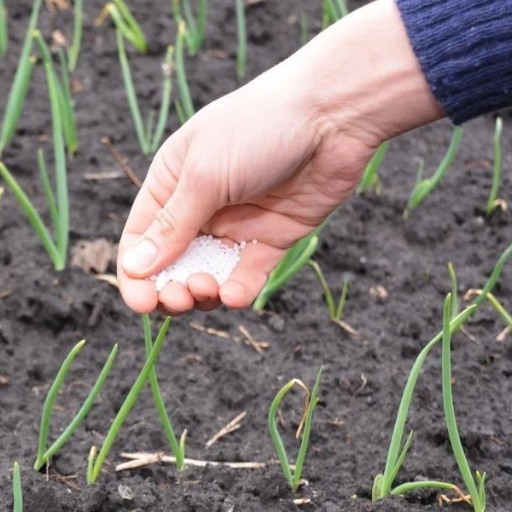
Determining When Onion Plants Need Fertilizer
Keep an eye on the growth stages and overall health of onion plants to determine whether they require fertilizer. In general, fertilizing onions at different points during their growth cycle is beneficial. Below are some factors that indicate the best time for fertilization:
- Initial Planting and Early Growth: Use a balanced or high phosphorus content fertilizer for root development. This first feeding ensures a vigorous start.
- Leaf Formation: Nitrogen-rich fertilizers are important to onion plants at this stage as they develop leaves about four weeks after planting. It results in lush, green growth which is vital for photosynthesis as well as energy production.
- Bulb Enlargement: Use a fertilizer with higher potassium levels when the bulbs start swelling usually around mid to late summer. Potassium facilitates bulb development and overall healthy plant.
Proper observation and periodic soil analysis help identify specific nutrient deficiencies. Yellowing leaves might mean little nitrogen while poor bulb formation could be linked to lack of potassium. By doing this according to signs like these in your fertilization timetable or following soil test recommendations, you will ensure that your onion plants receive all required nutrients for optimal growth and maximum yield.
Seasonal Fertilizing Schedule for Onions
A well-designed seasonal fertilizing schedule is key to good onion growth and high yields. Here is a brief guide based on information from top horticulture websites:
- Early Spring (Pre-Planting): Before you plant onions incorporate a balanced fertilizer into the soil. This prepares the ground by supplying essential nutrients.
- Planting Time: At the time of planting use starter fertilizer high in Phosphorus for root development.
- Early Growth (First 4-6 Weeks): Apply nitrogenous fertilizers during robust leafy vegetation growth by applying them approximately two to three weeks after planting; repeat every two weeks throughout this period.
- Mid-Season (Bulbing): At bulbing, which typically occurs around mid-summer, change to a high-K fertilizer. Apply every 2 – 3 weeks to help with bulb development.
- Late Season (Final Month Before Harvest): Stop fertilizing about one month before expected harvest time. This allows the onions to mature and avoids over-fertilization that may affect their keepability.
Change these timings based on specific growth observations and soil test results so that you supply your onions with site-specific nutrient management throughout their growing season.
Should You Use Manure as a Fertilizer for Onions?
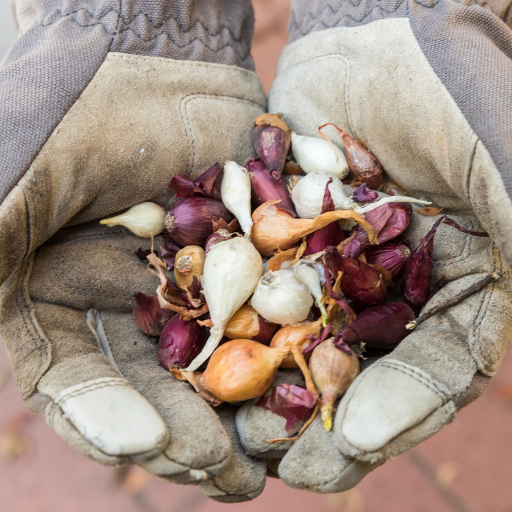
Benefits and Drawbacks of Manure Use
- Nutrient-rich: Manure provides organic matter and essential nutrients such as potassium, phosphorus, and nitrogen vital for healthy onion growth.
- Improves Soil Structure: The use of manure improves soil texture and aeration making it possible for proper root establishment which is key to plant healthiness.
- Water retention: Manure helps in retaining water in soil hence ensuring that onion plants have a continuous supply of water during dry spells.
- Microbial Activity: The presence of manure stimulates microbial activity in the soil leading to a healthier soil ecosystem. This leads to an improved availability of nutrients and their uptake by onion plants.
- Weed Seeds: One major disadvantage of using manure is that there may be introduction of weed seeds into the soil which compete with onions for resources.
- Odor: Manure can give off an unpleasant smell that may be unwelcome especially in residential or urban gardening sites.
- Pathogens: Using improperly composted manures can introduce pathogens into the soils which could result into plant diseases or contamination issues.
- Nutrient Imbalance: Although rich in different sorts of nutrients, improper management can sometimes lead to nutrient imbalances related to manures.
For example, excessive leaf growth rather than bulb development may result from too much application of nitrogen-rich composts. These advantages and disadvantages are weighed against each other when using manure before ensuring if it is well-composted and applied appropriately without having any negative impacts on your yield crop.
How To Successfully Incorporate Manure Into Your Onion Bed
Firstly, I ensure that the manure I use has been well-composted so as to eliminate pathogens and weed seeds. My first step involves spreading about 2-3 inches layer composted manure over the entire onion bed while taking care not to wet but moisten the soil. The following thing I do is using garden fork or tiller gently work my way through the top 6-8 inches of soil while being careful to ensure a uniform mix that is best for nutrient availability. After adding manure, I even the soil surface and watered it thoroughly so as to help in activating microbial activity and nutrient integration. By doing this, I ensure that my onion plants grow healthy and strong by creating an environment rich in nutrients and well balanced.
Frequently Asked Questions (FAQs)
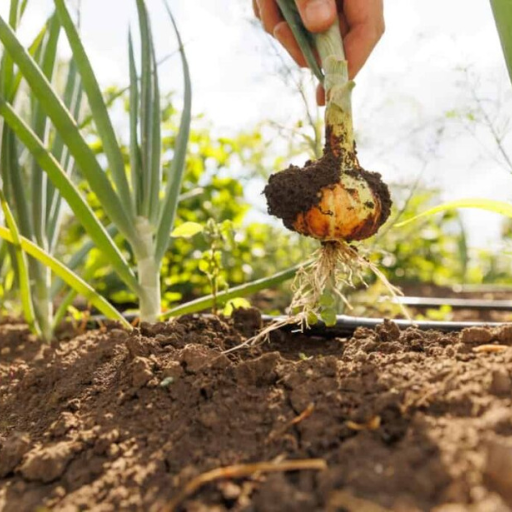
Q: What is a high nitrogen fertilizer and why is it good for onions?
A: Let me begin by explaining that a high nitrogen fertilizer is one which is full of nitrogen, an important element in promoting the growth of leaves. It will be beneficial to onions because they are heavy feeders requiring plenty of nitrogen to develop healthy foliage, which in turn enhance bulb formation.
Q: Is feather meal a good option for fertilizing onions?
A: Yes, feather meal is a slow release, organic onion fertilizer that contains large amounts of nitrogen. This helps maintain a steady supply of nitrogen needed to support vigorous growth in young onion seedlings and mature plants.
Q: What n-p-k ratio should be used for onions?
A: The recommended n-p-k ratio for growing onions includes high levels of N with balanced P and K. An example would be 10-10-10 or similar since they encourage both leafy and bulb development when applied on onions.
Q: How often do I need to fertilize my onions?
A: In order to grow the biggest possible onions you should apply some high-nitrogen sidedressings every two or three weeks throughout the growing season from planting time.
Q: Can I use synthetic fertilizer for onions?
A: Although synthetic fertilizers can be used, many gardeners prefer using organic alternatives such as feather meal, well rotted manure or balanced npk plant food that nurtures healthier soil and promotes more sustainable onion farming practices.
Q: What is the best time to fertilize onion seedlings?
A:The best moment for feeding your newly transplanted onion seedlings by applying high-nitrogen manures has come; this will accelerate their initial growth phase making them stronger and healthier.






